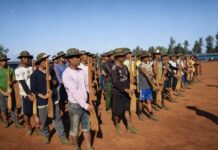[clear]
[dropcap]S[/dropcap]ince the problematic issue of child soldiers hit the headlines with the Human Rights Watch’s (HRW) 220 page report “My Gun Was As Tall As Me – Child Soldiers in Burma” in 2002, the case of Aung Ko Htwe, who was forcibly recruited and conscripted into the army also known as the Tatmadaw when he was only 14 years old, in 2005, has been drawing media attention locally and internationally. In between he is now 27 years old.
Even in the HRW 2002 report estimated that 20% of the 350,000 Tatmadaw’s soldiers might be children, which amounted to 70,000 child soldiers.
The continued media attention is due to Aung Ko Htwe receiving two years and six months jail sentence on March 28, and is facing other charges for misbehaving in court and disrespecting the constitution (Union Seal Act), which he reportedly was said to have stepped on the copy of the constitution in protest of the court during the hearing.
Aung Ko Htwe was arrested on August 18 last year, about one week after his interview was published by Radio Free Asia, where he focused on his forced conscription and hardships within the army as a child soldier. This, however, is seen by the Tatmadaw’s Lieutenant Colonel Myo Myint Aung as violating the dignity of the Tatmadaw and led to a charge under section 505(b) of the Penal Code, a provision broadly covering public incitement.
The section 505(b) of the penal code prohibits statements made “with intent to cause, or which [are] likely to cause, fear or alarm to the public or to any section of the public whereby any person may be induced to commit an offence against the State or against public tranquility.”

Earlier on Sunday April 1, 154 Civil Society Organizations (CSOs) that signed a statement — including Equality Myanmar, the National Network for Education Reform, PEN Myanmar and the Kachin Peace Network — demanding the immediate release of Aung Ko Htwe. The coalition is also urging that the 505(b) conviction handed down against him on March 28 and the pending Union Seal Act charge be unconditionally dropped.
As the CSOs’ lobbying for the release of former child soldier Aung Ko Htwe goes on, a piece of good news in trying to do away with the child soldiers’ problematic is being reported.
According to the Ministry of Defence announcement in the government media on April 26, 47 Tatmadaw (military) officers who recruited children to become soldiers have been sanctioned by the military. Accordingly, Lt Gen Sein Win said that the officers have faced sanctions without giving details meted out against them.
The Tatmadaw statement said the recruit age is at least 18 years old and that 4315 future soldiers have been examined using this method, including a bone X-ray. In addition, some 30,000 military personnel including officers have been informed of the prohibition against underage recruiting in the armed forces, which is repeated once every two months.
Lieutenant General Sein Win also emphasized that a 12-member committee in charge of preventing military recruitment of children was formed in 2016, at the order of the President’s Office.
The government and United Nations Country Task Force on Monitoring and Reporting (UNCTFMR) signed an agreement on June 27, 2012, with the aim of preventing military recruitment of underage children in Myanmar. The Tatmadaw said 877 underage soldiers were sent back to their guardians in cooperation with the UNCTFMR, according to the Myanmar Times recent report.
When one looks at the two episodes namely, the radio interview of the former child soldier and commitment of the government to end the underage recruitment in the army, there should be a way out to handle the situation in good faith for the benefit of the country and the former child soldiers that have been robbed of their childhood and also suffered a lot.
From this outgoing point and also as the over 150 CSOs urging statement of April 1, the concerned authorities should be more accommodating to the freedom of expression notion, which reads: “We have determined that by speaking to media about forced conscription and arduous training as a child soldier, Aung Ko Htwe was merely exercising his rights as a citizen, as set forth in the Constitution’s Chapter 8: ‘Citizens, Citizens’ Fundamental Rights and Duties,’ Article 354[a], regarding the right to express and publish convictions and opinions freely. Thus, it is not violating the law.”
The statement explicitly also stressed: “Also, filing lawsuits against Aung Ko Htwe for [his] recounting of forced conscription to the media outlet is suppression of freedom of expression by use of authority, which we believe is [another] violation of basic human rights.”
A much harsher tone comes from Brad Adams, Human Rights watch Asia director: “The prosecution of Aung Ko Htwe reveals the depths of the Myanmar military’s efforts to muzzle anyone who exposes its wrongdoing.” .
He stressed: “Former child soldiers should receive support and rehabilitation, not further military abuse. The authorities should immediately pardon and release him.”
The real point of argument is that Aung Ko Htwe has only been narrating his experience encompassing the years prior to the government signing of the UNCTFMR agreement in 2012. Thus, the Tatmadaw shouldn’t be too concerned of Aung Ko Htwe’s narrative, as for the present it has been following the recruitment procedures according to the agreement; and if the reports are true, the Tatmadaw is trying to become a standard army by instructing its troops to act according to the law.
The best would be if leniency and forgiveness could be applied to overrule all the other legal charges – like Union Seal Act and disrespect of the court – and redress the sufferings of the former child soldier Aung Ko Htwe, the healing process of other hundreds if not thousands, that have shared the same fate with him would be lessened. This is at least what a caring government should project and implement for those, who have fallen victims to the ongoing armed conflict that has plagued the country for so long.











Leave a Comments